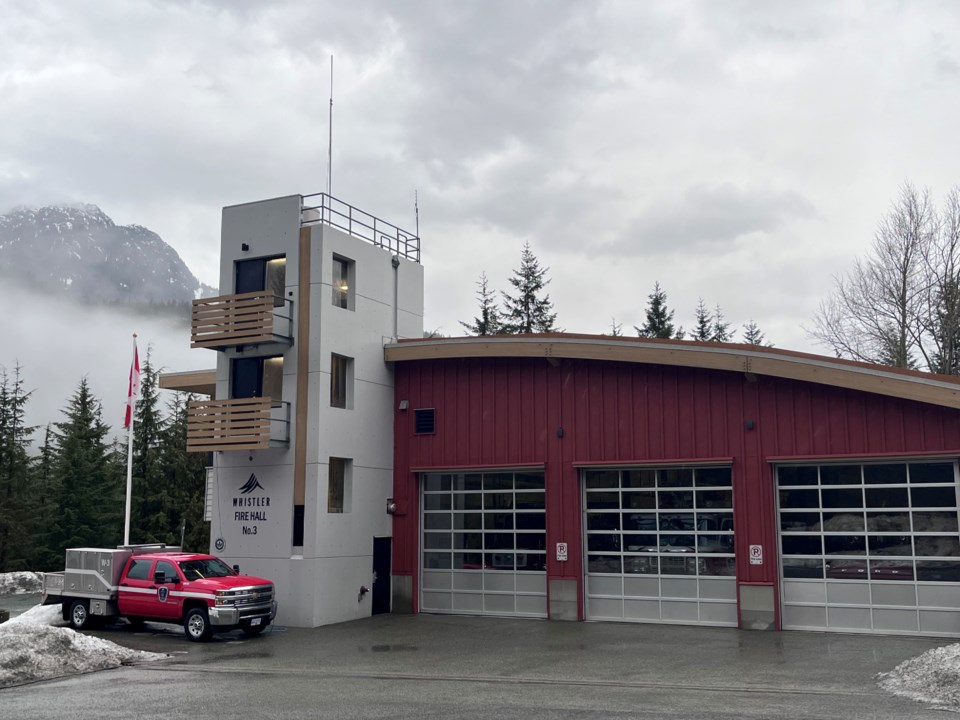Whistler's mayor and council has approved changes to its five-year financial plan, inspired by changes to staffing levels at the Whistler Fire Rescue Service (WFRS) and a handful of other projects.
Under the changes, which council gave first three readings to at the May 28 regular meeting, the Resort Municipality of Whistler (RMOW) gave the green light to funding the increased staffing of its Fire Hall No. 3; adjusted Resort Municipality Initiative (RMI) spending; covered expenses for the recent code-of-conduct update; funded a cultural initiatives program; and updated transfers to the Cheakamus Crossing Affordable Employee Housing reserve (CCAEH).
The top item was the changes to WFRS staffing, which came about after council agreed to fully staff a second RMOW fire hall in January in order to increase the community’s fire-safety coverage.
“Today’s decision is to fund these expenditures,” explained the RMOW’s chief financial officer, Carlee Price, adding there are several components to the funding for the fire hall over the five-year period to 2028.
“First is to fund the 2024 expenditures for fire staffing through a reduced contribution to the general operating reserve,” she said.
“Then, for the years 2025 through 2028, the proposal is to fund these expenditures with an increased tax requisition. The proposed increased tax requisition is just a little bit too small in 2025 to 2026 to fund the full amount of planned fire-staffing expenditures, and so in just those two years, a proposed reduction to the general capital reserve contribution is also being recommended.
“In total, these changes will add $2.5 million in expenditures when fully rolled out in 2028 relative to expenditures for this program in 2023.”
In questioning, Councillor Cathy Jewett said she was caught on the increase in property taxes, and sought clarity on what percentage increase was required to raise the funds needed per year.
“We’ve avoided talking about tax rate in this report because we do need to have a future conversation about what this all means,” said chief administrative officer Ginny Cullen in response to Jewett’s line of questioning.
With further querying, Cullen added the RMOW wanted to “avoid landing on a specific rate now because we have lots of discussion to have before we do.”
On the RMI front, which are funds vended from the province to tourism-focused municipalities for tourism projects, Price reported an additional $1.3 million in RMI funds as a result of “excellent tourism performance in 2022 … this money has been agreed to be directed to support village and parks maintenance and landscaping in the year ahead.”
Price went on to explain that despite a reduction in payments into the general operating reserve as a result of the WFRS staffing changes for 2024, with additional RMI funds covering some tourism-facing projects, the otherwise taxpayer-sourced funds could be diverted back into the operating reserve, which as a result ended up higher than expected.
Other changes included funding for the RMOW’s legislative services in the review of committees of council, and the code of conduct. Initially, $30,000 was allocated, but an additional $30,000 was requested to complete both projects by the end of 2024.
Meanwhile, $50,000 is allocated to “cultural initiatives and learning and education videos” for 2024 that was expected to happen in 2023. According to a staff report, the videos are to “support education and awareness around important community values.”
“Videos in 2024 will be produced to support outcomes of our accessibility plan, as well as a video highlighting Lost Lake to support smart tourism, climate change, and engagement messages,” it reads.
Finally, the changes related to the CCAEH involve a new reserve-funds agreement with the Whistler Development Corp (WDC), which altered the amount paid to the CCAEH reserve over 2024 and 2025.
The full report can be read on the RMOW website, and Price’s presentation can be watched from 2:21:15 on the May 28 regular meeting recording.




